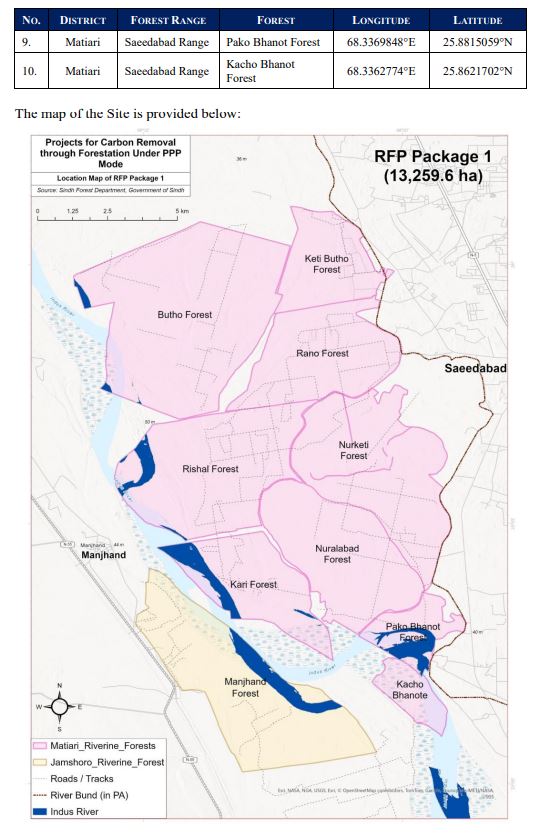After handing over vast swaths of agricultural land to private companies under its corporate farming policy, the Sindh government is now preparing to lease tens of thousands of acres of forest land in Jamshoro and Matiari districts.
According to documents reviewed and information from officials familiar with the process, the government is in the final stages of allocating 86,400 acres across 18 forest tracts to private firms on 44-year leases. The provincial forest department has received 11 bids for the leases.
The lands have been divided into three packages. Package One includes forests in Saeedabad—such as Batho, Keli Batho, Rano, Noor Kayeti, Noorulabad, Kari, Rashal, Pako Bhanooth, Kacho Bhanooth—and the Manjhand forest in Jamshoro. Four bids have been submitted for this package.
Package Two covers forests in Hala and Jamshoro, including Kacho Khanoth, Pako Khanoth, Salaro 1 and 2, Rais Mureed, Khebrani, and Rajri. Three bids have been received for these tracts.
Package Three includes the Inarpur forest, spanning both Matiari and Jamshoro districts. Four companies have submitted proposals for this package as well.
Each bidding company has reportedly submitted a bank guarantee of Rs 100 million (approximately $358,000 USD). According to sources, the technical committee overseeing the process completed its bid evaluations on May 26. The government is expected to finalize land allocations within three weeks.

But the plans have drawn sharp criticism from political opponents and Sindhi nationalists, who accuse the ruling Pakistan Peoples Party (PPP) of compromising provincial interests in exchange for power.
“The PPP has never hesitated to sell out Sindh,” said Lal Malhi, a former member of the National Assembly from Pakistan Tehreek-e-Insaf (PTI). Speaking to this reporter, Malhi referred to past decisions, including the approval of six major irrigation canals—two each in Sindh, Punjab, and Balochistan—made at the presidential level. “Whether it’s a dual system, six canals, or corporate farming, it’s all part of the same agenda,” he said.
Malhi claimed that under the guise of agricultural development, the government is facilitating the transfer of hundreds of thousands of acres to private companies — lands that, he said, rightfully belong to the local farmers who have lived and worked on them for generations. “We reject this scheme. These lands should be given to Sindhi farmers with resources to cultivate them,” he said.
He also warned of a creeping system of land dispossession. “The PPP is enabling a slow occupation of Sindh’s land. These leases can be cancelled at any time, but the government hasn’t done so — not even in the case of the six canals approved for Cholistan.”
Malhi alleged President Asif Ali Zardari is attempting to position his son, Bilawal Bhutto Zardari, as Pakistan’s next prime minister — a goal he said is “impossible through the vote.” Referring to a recent by-election in Sambrail, city of Punjab, Malhi noted that the PPP’s candidate received only three to four thousand votes. “PPP is losing ground across the country but is still trading Sindh’s land to hold onto power,” he said.
Leaders of Sindhi nationalist parties have also vowed resistance. Dr. Niaz Kalani, chairman of the Jeay Sindh Qaumi Mahaz, said the leasing of forest land to corporations is part and parcel of the same corporate farming policy his party has long opposed. “Wherever forest land is handed over to private companies, we will stage protests outside the offices of those responsible,” he said.















